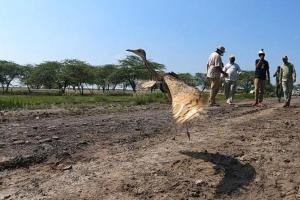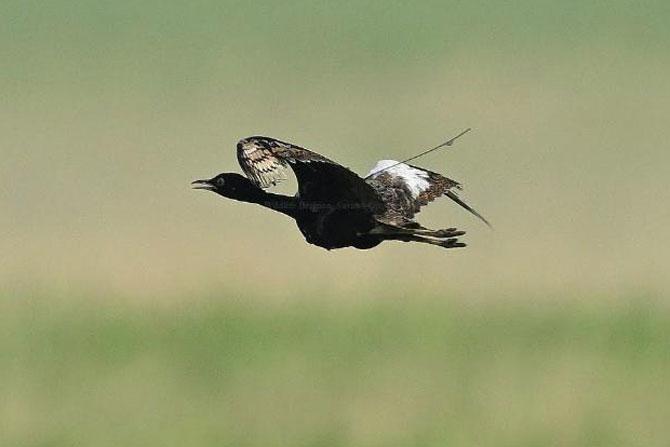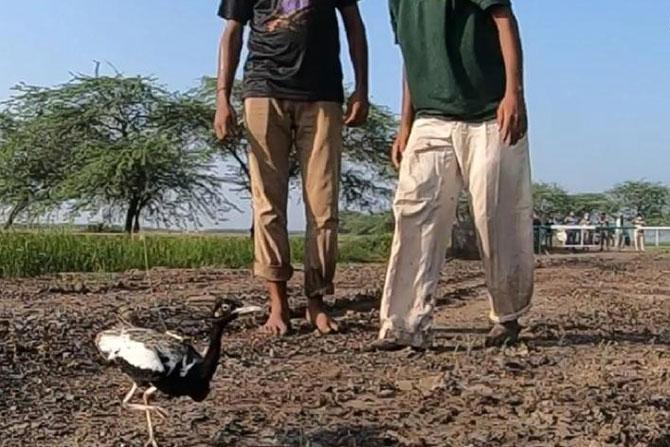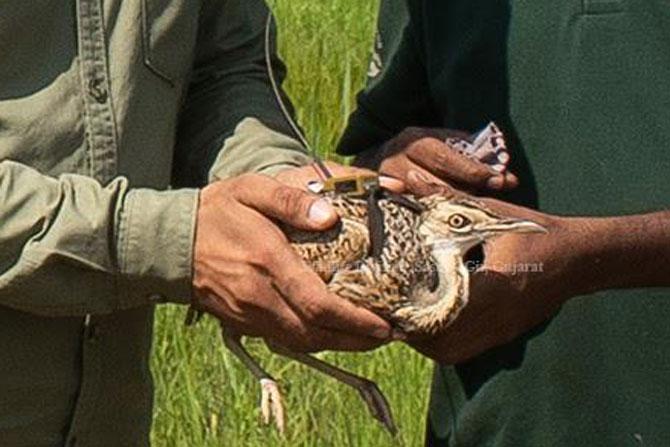The highest population density of Lesser Florican during the breeding season is found in and around Blackbuck National Park, Velavadar followed by Kutch in Gujarat

Satellite Telemetry of Lesser Florican in Saurashtra
A study that will help to look at the rapid decline in the population and to plan the future conservation strategies for Endangered Lesser Florican bird, a satellite telemetry project has begun in Saurashtra.
ADVERTISEMENT
It may be noted that Gujarat is home to three species of bustards - Great Indian Bustard, Lesser Florican, locally known as 'Khadmor', and Macqueen's Bustard locally known as 'Houbara'. Of these, Lesser Florican is the smallest bustard species and endemic to the Indian subcontinent and listed as Endangered as per International Union for Conservation of Nature (IUCN). Its population is declining rapidly in its native range with the global population estimated to be less than 700 individuals.

Their habitats during the nonbreeding season are believed to be in the south and south-east India
The major population during the breeding season (monsoon) is found in the states of Gujarat, Rajasthan, and Madhya Pradesh. Maharashtra and Andhra Pradesh are the other range states of the species. Their habitats during the nonbreeding season are yet unknown but believed to be in the south and south-east India.
Their sightings in India other than the breeding season have become rare and no prudent information regarding their migration is available till now. The highest population density of Lesser Florican during the breeding season is found in and around Blackbuck National Park, Velavadar followed by Kutch in Gujarat. Every year, the Gujarat Forest Department regularly monitors the population in Blackbuck National Park, Velavadar during the monsoon season.
Looking at the rapid decline in the population and to plan the future conservation strategies, it was important to understand the movement and habitat use of Lesser Floricans in the breeding and non-breeding seasons. Therefore, a project was developed by Wildlife Division Sasan-Gir and submitted to the central government by Gujarat Forest Department to tag Lesser Floricans. The project was subsequently approved, and consultations and discussions with international and national bustard experts were held. Consequently, two Solar PTTs (Platform Transmitter Terminals) suitable for the species were procured by the Gujarat Forest Department.

It is important to understand the habitat use of Lesser Floricans in the breeding and non-breeding seasons
The exercise for tagging Lesser Floricans was carried out between September 1 to 5 at the Blackbuck National Park, Velavadar, wherein thorough field survey and observations were carried out and one male and one female Lesser Floricans were tagged with PTTs following safety protocols and proper procedure with the help of skilled and experienced trappers.
This is the first time Gujarat Forest Department has deployed PTTs on birds. It is also important to note that it is the first time that a female Lesser Florican has been tagged in the world, which will provide vital information on their movement and help in developing insights into the breeding ecology of the species. The tagging will help in obtaining data regarding the movement, habitat preference, and ranging patterns of the species and allow monitoring of the individuals on a regular basis. This information is very crucial in devising conservation strategies for the species in its breeding and non-breeding habitats.
Kedar Gore - Director, The Corbett Foundation and Member, IUCN Species Survival Commission, Bustard Specialist Group said, "With less than 700 Lesser Florican left in the wild, India certainly needs to take urgent measures to prevent the extinction of this endangered, endemic, and the smallest bustard species of India. Bustards need grasslands for their survival. Thus, a separate grassland conservation policy is essential to ensure that the remaining patches of natural grasslands in India are protected and not classified as 'revenue wastelands'."

The data collected will help to plan the conservation of Lesser Florican in India
Gore also said that habitat encroachment, uncontrolled grazing of livestock, the growing menace of feral dogs, hunting, use of inorganic pesticides are some of the conservation issues to be addressed involving the local community.
"In the first week of September 2020, a male and a female Lesser Florican were tagged and safely released in Blackbuck National Park. This research study will give the much-needed information on the whereabouts of these birds beyond their known breeding grounds. The crucial information collected will be useful to plan the conservation of Lesser Florican in India, of which less than 700 birds exist on this planet," he added.
The entire exercise was carried out under the direction and guidance of Shyamal Tikadar, IFS, PCCF (Wildlife) & CWLW, Gujarat State, Gandhinagar, D.T. Vasavada, IFS, CCF Wildlife Circle, Junagadh and under the supervision of Dr. Mohan Ram, IFS, DCF Wildlife Division, Sasan-Gir.
The bustard experts involved included Devesh Gadhavi, Kedar Gore from The Corbett Foundation, and Dr. Indra Gadhvi, Honorary Wildlife Warden of Bhavnagar District. Mahesh Trivedi, ACF, and forest staff of Blackbuck National Park, Velavadar assisted and supported the exercise. The scientific documentation and necessary facilitation during the exercise were carried out by Dr. Dhawal Mehta and Karshan Vala who are associated for the research work with the wildlife Division, Sasan-Gir.
Keep scrolling to read more news
Catch up on all the latest Crime, National, International and Hatke news here. Also download the new mid-day Android and iOS apps to get latest updates.
Mid-Day is now on Telegram. Click here to join our channel (@middayinfomedialtd) and stay updated with the latest news
 Subscribe today by clicking the link and stay updated with the latest news!" Click here!
Subscribe today by clicking the link and stay updated with the latest news!" Click here!







